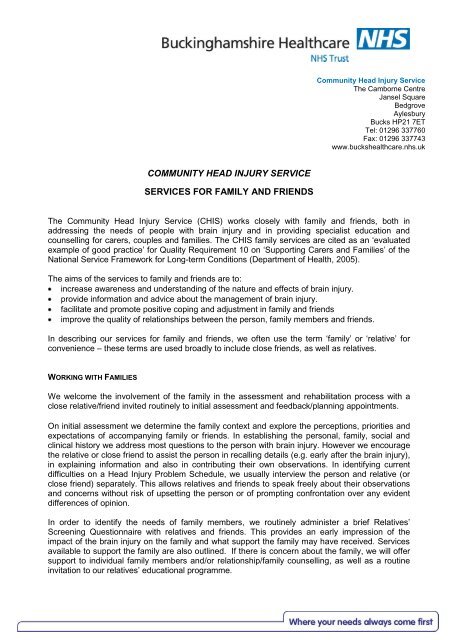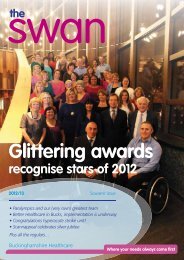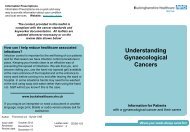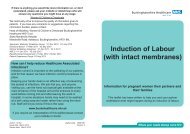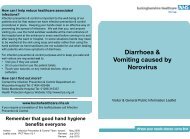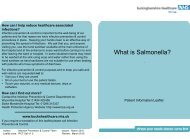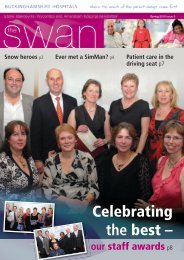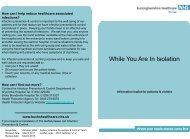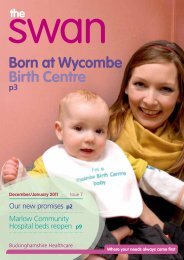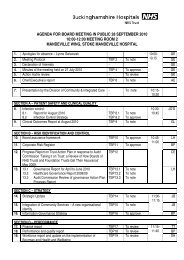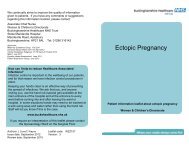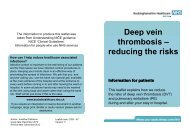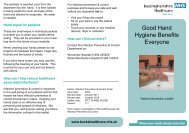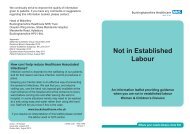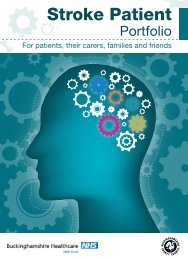community head injury service services for family and friends
community head injury service services for family and friends
community head injury service services for family and friends
Create successful ePaper yourself
Turn your PDF publications into a flip-book with our unique Google optimized e-Paper software.
Community Head Injury Service<br />
The Camborne Centre<br />
Jansel Square<br />
Bedgrove<br />
Aylesbury<br />
Bucks HP21 7ET<br />
Tel: 01296 337760<br />
Fax: 01296 337743<br />
www.buckshealthcare.nhs.uk<br />
COMMUNITY HEAD INJURY SERVICE<br />
SERVICES FOR FAMILY AND FRIENDS<br />
The Community Head Injury Service (CHIS) works closely with <strong>family</strong> <strong>and</strong> <strong>friends</strong>, both in<br />
addressing the needs of people with brain <strong>injury</strong> <strong>and</strong> in providing specialist education <strong>and</strong><br />
counselling <strong>for</strong> carers, couples <strong>and</strong> families. The CHIS <strong>family</strong> <strong>service</strong>s are cited as an ‘evaluated<br />
example of good practice’ <strong>for</strong> Quality Requirement 10 on ‘Supporting Carers <strong>and</strong> Families’ of the<br />
National Service Framework <strong>for</strong> Long-term Conditions (Department of Health, 2005).<br />
The aims of the <strong>service</strong>s to <strong>family</strong> <strong>and</strong> <strong>friends</strong> are to:<br />
increase awareness <strong>and</strong> underst<strong>and</strong>ing of the nature <strong>and</strong> effects of brain <strong>injury</strong>.<br />
provide in<strong>for</strong>mation <strong>and</strong> advice about the management of brain <strong>injury</strong>.<br />
facilitate <strong>and</strong> promote positive coping <strong>and</strong> adjustment in <strong>family</strong> <strong>and</strong> <strong>friends</strong><br />
improve the quality of relationships between the person, <strong>family</strong> members <strong>and</strong> <strong>friends</strong>.<br />
In describing our <strong>service</strong>s <strong>for</strong> <strong>family</strong> <strong>and</strong> <strong>friends</strong>, we often use the term ‘<strong>family</strong>’ or ‘relative’ <strong>for</strong><br />
convenience – these terms are used broadly to include close <strong>friends</strong>, as well as relatives.<br />
WORKING WITH FAMILIES<br />
We welcome the involvement of the <strong>family</strong> in the assessment <strong>and</strong> rehabilitation process with a<br />
close relative/friend invited routinely to initial assessment <strong>and</strong> feedback/planning appointments.<br />
On initial assessment we determine the <strong>family</strong> context <strong>and</strong> explore the perceptions, priorities <strong>and</strong><br />
expectations of accompanying <strong>family</strong> or <strong>friends</strong>. In establishing the personal, <strong>family</strong>, social <strong>and</strong><br />
clinical history we address most questions to the person with brain <strong>injury</strong>. However we encourage<br />
the relative or close friend to assist the person in recalling details (e.g. early after the brain <strong>injury</strong>),<br />
in explaining in<strong>for</strong>mation <strong>and</strong> also in contributing their own observations. In identifying current<br />
difficulties on a Head Injury Problem Schedule, we usually interview the person <strong>and</strong> relative (or<br />
close friend) separately. This allows relatives <strong>and</strong> <strong>friends</strong> to speak freely about their observations<br />
<strong>and</strong> concerns without risk of upsetting the person or of prompting confrontation over any evident<br />
differences of opinion.<br />
In order to identify the needs of <strong>family</strong> members, we routinely administer a brief Relatives’<br />
Screening Questionnaire with relatives <strong>and</strong> <strong>friends</strong>. This provides an early impression of the<br />
impact of the brain <strong>injury</strong> on the <strong>family</strong> <strong>and</strong> what support the <strong>family</strong> may have received. Services<br />
available to support the <strong>family</strong> are also outlined. If there is concern about the <strong>family</strong>, we will offer<br />
support to individual <strong>family</strong> members <strong>and</strong>/or relationship/<strong>family</strong> counselling, as well as a routine<br />
invitation to our relatives’ educational programme.
Page 2/5 CHIS-FS-Sum-April2011<br />
Relative or close <strong>friends</strong> are invited routinely to feedback sessions to discuss the results of<br />
assessment <strong>and</strong> rehabilitation plans/goals to develop a shared underst<strong>and</strong>ing of the major issues,<br />
priorities <strong>and</strong> interventions. During rehabilitation ongoing liaison with the <strong>family</strong> is undertaken by a<br />
designated rehabilitation key-worker or Working Out programme manager, both to facilitate <strong>and</strong><br />
rein<strong>for</strong>ce interventions <strong>and</strong> to elicit ongoing feedback about progress at home <strong>and</strong> any emergent<br />
difficulties. Relatives are invited routinely to contribute to review <strong>and</strong> follow-up processes. Over<br />
time the <strong>service</strong>s available to the <strong>family</strong> may be outlined again, as appropriate.<br />
FAMILY SERVICES<br />
CHIS <strong>family</strong> <strong>service</strong>s include an annual brain <strong>injury</strong> educational programme, follow-up workshops,<br />
individual carer support, <strong>and</strong> specialist relationship/<strong>family</strong> counselling (see attached Figure).<br />
CHIS: Working with Families<br />
INITIAL<br />
ASSESSMENT<br />
FEEDBACK &<br />
PLANNING<br />
INDIVIDUAL<br />
CARER SUPORT<br />
FAMILY<br />
SCREENING<br />
EDUCATIONAL<br />
PROGRAMME<br />
FOLLOW-UP<br />
SESSIONS<br />
REVIEW /<br />
FOLLOW-UP<br />
FAMILY<br />
ASSESSMENT<br />
RELATIONSHIP<br />
COUNSELLING<br />
LONG-TERM<br />
WORKSHOPS<br />
Relatives’ educational programme<br />
We provide an annual educational programme on the nature <strong>and</strong> effects of brain <strong>injury</strong> (see<br />
attached programme summary. This is currently run in a monthly Wednesday evening <strong>for</strong>mat.<br />
This covers the following topics:<br />
1. Brain function <strong>and</strong> traumatic brain <strong>injury</strong>.<br />
2. Cognitive impairment – general.<br />
3. Cognitive impairment – executive.<br />
4. Communication difficulties.<br />
5. Behavioural difficulties.<br />
6. Emotional difficulties.<br />
7. Physical <strong>and</strong> sensory difficulties<br />
8. Medical aspects of brain <strong>injury</strong>.<br />
9. Vocational difficulties.<br />
10. Personal impact <strong>and</strong> adjustment.<br />
11. Family impact <strong>and</strong> adjustment.<br />
12. Services <strong>for</strong> people with brain <strong>injury</strong> <strong>and</strong> their relatives
Page 3/5 CHIS-FS-Sum-April2011<br />
The sessions follow a similar pattern combining presentations with illustrative videotapes, group<br />
discussion <strong>and</strong> general questions, together with a coffee break to allow <strong>for</strong> in<strong>for</strong>mal peer support.<br />
The presentations combine talks <strong>and</strong> the viewing <strong>and</strong> discussion of illustrative videotapes of<br />
clients <strong>and</strong> relatives talking about the specific area of difficulty. The videotapes illustrate the<br />
particular area of difficulty <strong>and</strong> act as a catalyst <strong>for</strong> general discussion <strong>and</strong> questions. If numbers<br />
allow we may split relatives into small groups (e.g. partners <strong>and</strong> parents) to discuss the nature<br />
<strong>and</strong> impact of difficulties experienced by their injured relative, feeding back to the large group.<br />
Follow-up relatives’ sessions<br />
Following the above educational series, attendees each year are invited to one or more follow-up<br />
sessions to see how relatives are progressing, to provide further professional <strong>and</strong> peer support<br />
<strong>and</strong> to address cover additional topics of interest (e.g. carers support <strong>service</strong>s, benefits etc).<br />
Long-term relatives’ workshops<br />
One or two follow-up workshops are also organised per annum to address long-term concerns<br />
about living with / supporting a relative with brain <strong>injury</strong>. Topics are suggested by group members<br />
(e.g. stress of ongoing care, independent living, taking-risks, <strong>family</strong> relationships etc). Depending<br />
on numbers relatives may explore topics in small groups be<strong>for</strong>e feeding back themes <strong>and</strong> issues<br />
<strong>for</strong> general discussion in the larger group. Whilst some relatives attend these long-term groups<br />
regularly, others come only when they feel in need of further professional or peer support.<br />
Occasional additional sessions are also organized specifically <strong>for</strong> the adult children <strong>and</strong>/or siblings<br />
of people with brain <strong>injury</strong>.<br />
Individual <strong>family</strong> / carer support<br />
Our Family Specialist is available to see individual <strong>family</strong> members <strong>for</strong> short or long-term<br />
emotional support. This may be provided in the <strong>family</strong> home or the rehabilitation centre as the<br />
relative or friend wishes. In this way some individual <strong>family</strong> members are supported throughout<br />
the course of recovery <strong>and</strong> adjustment, others during periods of active rehabilitation, maintenance<br />
support or when active involvement with the client has ceased. This support is taken up by both<br />
parents <strong>and</strong> partners, <strong>and</strong> occasionally by close <strong>friends</strong> or other <strong>family</strong> members (i.e. siblings <strong>and</strong><br />
children) or <strong>friends</strong>. (It should be noted that the <strong>service</strong> can only see children or siblings under the<br />
age of 16 if accompanied by a one or other parent). For some families individual support is<br />
provided in parallel with joint relationship or <strong>family</strong> counselling.<br />
Relationship / <strong>family</strong> counselling<br />
Specialist relationship / <strong>family</strong> counselling is available, often provided jointly by a clinical<br />
neuropsychologist (one of whom is also a trained couples’ therapist) <strong>and</strong> the <strong>family</strong> specialist.<br />
Some couples may be seen early post-<strong>injury</strong> or during active rehabilitation to address specific<br />
difficulties, others are seen <strong>for</strong> help with couple or <strong>family</strong> adjustment years post-<strong>injury</strong>.<br />
On initial assessment the relatives’ screening questionnaire provides an early impression of the<br />
stress, distress <strong>and</strong> coping of <strong>family</strong> members. Where there is a need <strong>for</strong> relationship/<strong>family</strong><br />
counselling, we may on occasions complete <strong>for</strong>mal <strong>family</strong> assessment scales to underst<strong>and</strong> more<br />
about the <strong>family</strong> impact prior to, or shortly after, starting intervention. This may include a number<br />
of <strong>family</strong> rating scales (further in<strong>for</strong>mation available on request). Such scales are selected <strong>for</strong> the<br />
particular <strong>family</strong> circumstances, with some more suited to couples or child/parent relationships).<br />
Clinically, such scales have proved valuable: in clarifying the nature <strong>and</strong> extent of <strong>family</strong> needs; in<br />
identifying potential avenues <strong>for</strong> therapy; in facilitating engagement; <strong>and</strong> in monitoring change<br />
during intervention in individual cases. Feedback of <strong>family</strong> assessment results needs to be<br />
h<strong>and</strong>led with sensitivity <strong>and</strong> care due to the sometimes dramatic impact on <strong>family</strong> ratings post<strong>injury</strong><br />
<strong>and</strong> the common discrepancy between ratings of partners or other <strong>family</strong> members.
Page 4/5 CHIS-FS-Sum-April2011<br />
In our experience the foundation <strong>for</strong> this specialist relationship counselling is in establishing an<br />
appropriate brain <strong>injury</strong> framework to promote a shared underst<strong>and</strong>ing as to how partner <strong>and</strong><br />
other <strong>family</strong> relationships have been affected by the brain <strong>injury</strong>. A focus is often on reducing<br />
conflict <strong>and</strong> re-establishing communication <strong>and</strong> positive connection between <strong>family</strong> members (<strong>and</strong><br />
intimacy in the case of couples). The <strong>for</strong>mat of couple <strong>and</strong> <strong>family</strong> sessions varies markedly from<br />
couple to couple <strong>and</strong> from <strong>family</strong> to <strong>family</strong>. For example some couples are seen only <strong>for</strong> joint<br />
sessions, others are also seen individually (e.g. <strong>for</strong>tnightly or monthly joint sessions interspersed<br />
with individual sessions). Work with child relatives is also available, with children under the age of<br />
16 seen with one or both of their parents (or other appropriate adult).<br />
Some couples are currently being seen specifically <strong>for</strong> emotion focussed couples therapy (see<br />
Bowen et al. 2010). This is an evidence-based approach to couples’ work, based on systemic <strong>and</strong><br />
attachment theory. Its aim is to work actively with emotion in the session to identify negative<br />
cycles between the couple (<strong>and</strong> the impact of the <strong>injury</strong> on this) <strong>and</strong> to develop alternative<br />
patterns of interaction to enhance connection <strong>and</strong> intimacy. This approach is currently being<br />
explored within the <strong>service</strong> <strong>and</strong> viewed positively by the staff involved. It is hoped to evaluate its<br />
efficacy <strong>for</strong> couples after brain <strong>injury</strong> over the coming years.<br />
In summary, drawing upon the above the Community Head Injury Service seeks to address the<br />
needs of relatives <strong>and</strong> close <strong>friends</strong> of people with brain <strong>injury</strong>. Sometimes the <strong>family</strong> work is<br />
provided in parallel with individual work with the person, sometimes it naturally follows this work.<br />
FURTHER INFORMATION:<br />
Tyerman A & Barton S (2008). Working with families: A <strong>community</strong> <strong>service</strong> example. In A<br />
Tyerman & NS King. (eds.). p449-474. Psychological approaches to rehabilitation after traumatic<br />
brain <strong>injury</strong>. Ox<strong>for</strong>d: BPS Blackwell. .<br />
REFERENCE:<br />
Bowen C, Yeates GN & Palmer S (2010). A relational approach to rehabilitation: Thinking about<br />
relationships after brain <strong>injury</strong>. London: Karmac.
Page 5/5 CHIS-FS-Sum-April2011<br />
COMMUNITY HEAD INJURY SERVICE<br />
GROUP / ACTIVITY PROGRAMME SUMMARY 2011<br />
GROUP TITLE:<br />
AIMS:<br />
RELATIVES’ EDUCATIONAL PROGRAMME<br />
To increase awareness <strong>and</strong> underst<strong>and</strong>ing of the nature <strong>and</strong><br />
effects of traumatic <strong>and</strong> other <strong>for</strong>ms of acquired brain <strong>injury</strong>.<br />
To provide the opportunity <strong>for</strong> peer group support <strong>for</strong> relatives<br />
of people with brain <strong>injury</strong><br />
CONTENT:<br />
FORMAT<br />
LOCATION:<br />
Brain function / nature of brain <strong>injury</strong><br />
Physical disability<br />
Sensory deficits<br />
Cognitive impairment – general<br />
Cognitive impairment – executive<br />
Communication difficulties<br />
Behavioural difficulties<br />
Emotional difficulties<br />
Vocational difficulties<br />
Personal impact <strong>and</strong> adjustment<br />
Family impact <strong>and</strong> adjustment<br />
Services <strong>for</strong> people with brain <strong>injury</strong> & their relatives<br />
Educational <strong>for</strong>mat with talks (supporting h<strong>and</strong>outs), videotape<br />
examples, questions <strong>and</strong> discussion<br />
Group Room, The Camborne Centre<br />
DAY OF WEEK / TIME: Wednesdays: 19.00-21.00<br />
FREQUENCY / LENGTH:<br />
STAFF INVOLVED :<br />
LEAD THERAPIST(S)<br />
GROUP / ACTIVITY<br />
OPEN TO:<br />
Monthly: 12 X 2 hour sessions (e.g. September – August)<br />
+ one or more follow-up sessions<br />
Clinical neuropsychologists, medical consultant, occupational<br />
therapists, physiotherapist, speech & language therapist<br />
Consultant Clinical Neuropsychologist / Head of Service<br />
Brain Injury Family Specialist<br />
Relatives of people with brain <strong>injury</strong> attending the Community<br />
Head Injury Service.<br />
Relatives of people with brain <strong>injury</strong> attending other <strong>service</strong>s<br />
by referral <strong>and</strong> agreement.


